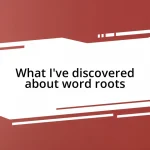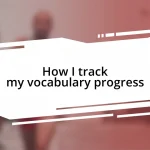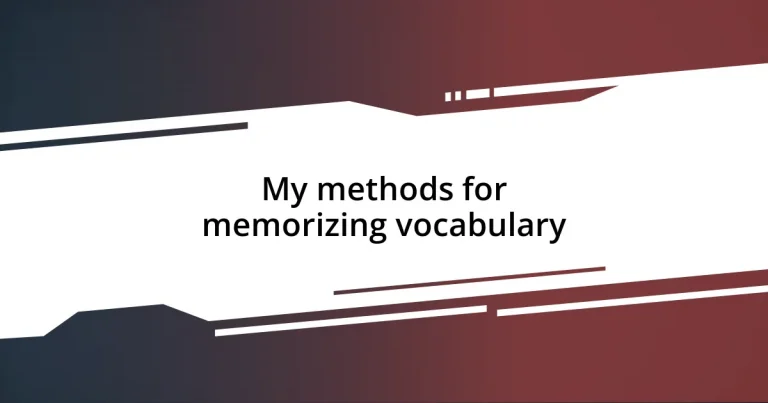Key takeaways:
- Understanding and leveraging your preferred learning style, such as using visual flashcards or storytelling, enhances vocabulary retention.
- Engaging with vocabulary in context through real-life applications improves comprehension and emotional connections to words.
- Tracking progress with methods like vocabulary journals and spaced repetition fosters accountability and reinforces learning.
- Employing mnemonic devices, such as acronyms or rhymes, makes memorization effective and enjoyable.
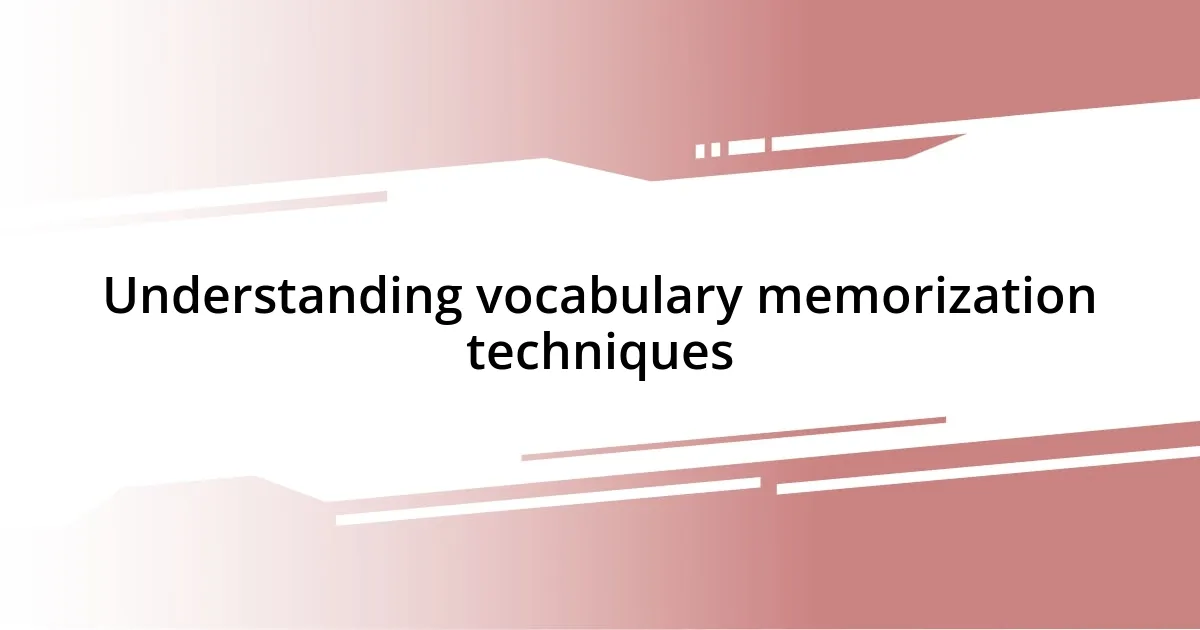
Understanding vocabulary memorization techniques
When it comes to memorizing vocabulary, I find that understanding your preferred learning style can make a significant difference. For instance, I’ve noticed that I absorb new words better when I create visual flashcards. Have you ever tried associating an image with a word? It’s like giving the vocabulary a little story that sticks in my mind.
Another technique I love is using the words in context. It’s one thing to memorize a list; it’s a completely different experience to use the vocabulary in sentences. I remember the time I wanted to remember the word “serendipity.” Instead of just repeating it, I wrote down how I stumbled upon an amazing café by chance. That association turned the word into something personal and memorable. Doesn’t it feel rewarding to learn vocabulary that resonates with our own experiences?
Finally, repetition is key, but it doesn’t have to be boring. I often make it a game by quizzing myself or even teaching the words to someone else. Have you ever tried teaching? There’s something powerful about explaining a concept that reinforces your own understanding. Each time I help someone grasp a term, I find I’m solidifying my own memory in the process. How do you incorporate repetition in your learning?
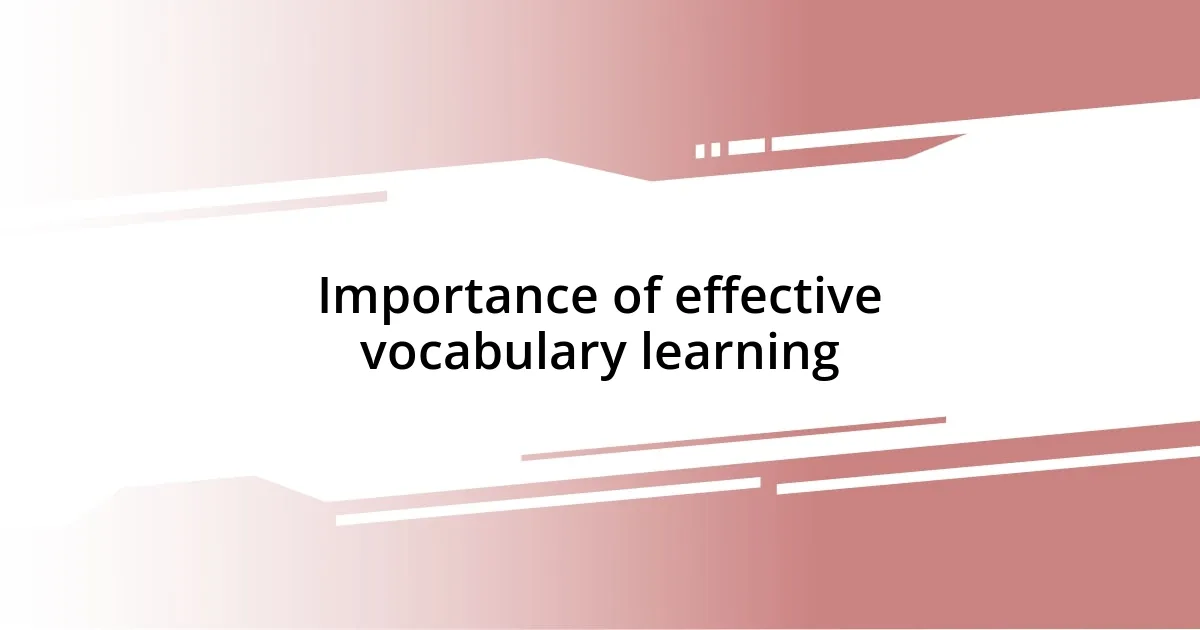
Importance of effective vocabulary learning
Effective vocabulary learning is crucial not just for passing tests, but for genuine communication. I recall a time when I struggled to express myself in a conversation because I couldn’t find the right words. That frustration motivated me to focus on expanding my vocabulary, leading to richer interactions and a deeper understanding of others. Have you ever felt lost for words? It’s an unsettling experience that can be easily avoided with the right strategies.
When students grasp vocabulary effectively, it enhances their reading comprehension, writing skills, and confidence. I remember helping my younger sibling with his homework. After spending time on vocabulary exercises, I saw him light up with excitement when he could use these new words in his writing. It’s amazing how the right vocabulary can transform a simple sentence into something powerful and engaging.
Moreover, mastering vocabulary can open doors to new opportunities and relationships. In my own life, being well-versed in specific terms allowed me to connect with colleagues in professional settings. This mutual understanding fostered collaboration and growth. Don’t you think language is a bridge that helps us connect with others?
| Importance | Effects |
|---|---|
| Enhanced Communication | Improved interactions and relationships |
| Improved Comprehension | Greater understanding of texts and contexts |
| Increased Confidence | Empowerment in expressing thoughts clearly |
| Professional Opportunities | Better networking and career advancement |
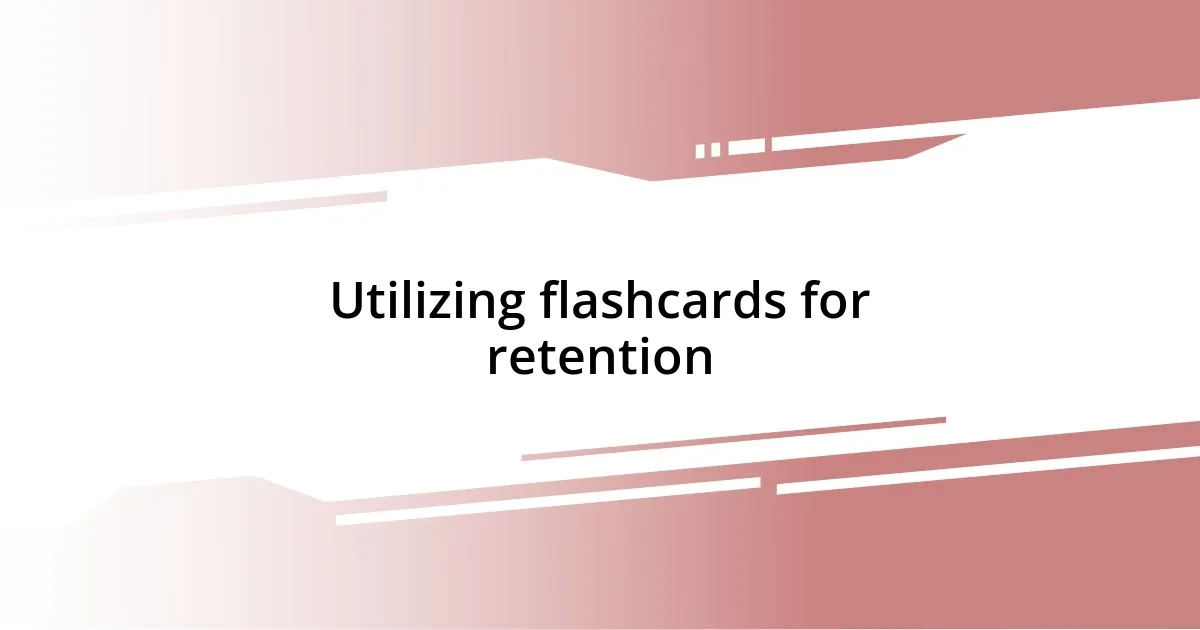
Utilizing flashcards for retention
Utilizing flashcards has been a game-changer for my vocabulary retention. I discovered that the tactile experience of flipping through cards while testing myself helps reinforce my memory. There’s something satisfying about physically engaging with each word, and it transforms study time into an interactive experience.
Here are some strategies I find effective when using flashcards:
- Visual Cues: I often add colorful images or symbols related to the words, which creates a vivid mental association.
- Example Sentences: Instead of just the word and its definition, I write a sentence using the word. This not only solidifies the meaning but also shows how context matters.
- Group Learning: Sometimes, I invite a friend over, and we quiz each other. It’s not just practice; it’s an opportunity to share insights and connect over learning.
I vividly recall a late-night study session where I was grappling with the word “ephemeral.” By creating a flashcard that combined the definition with the image of a fleeting sunset, I could almost feel the transient beauty. That visual made the meaning stick, and it still echoes in my mind whenever I see a sunset today. Utilizing flashcards, in my experience, doesn’t just help you remember words; it enriches your emotions tied to them, making the learning journey much more enjoyable.
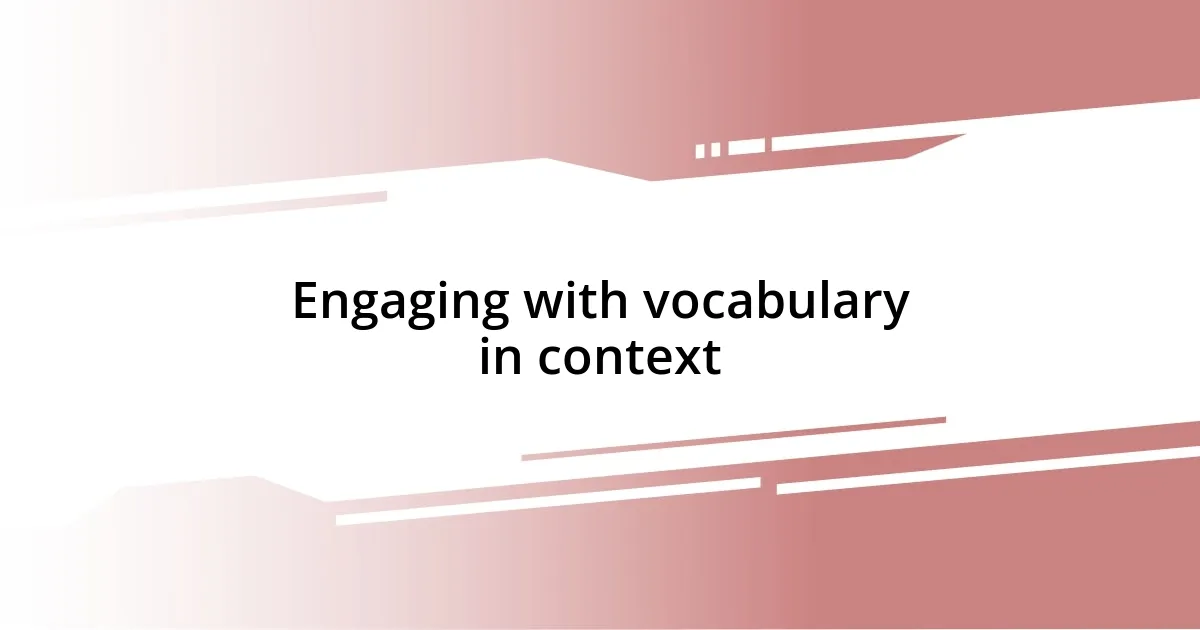
Engaging with vocabulary in context
Engaging with vocabulary in context truly transforms the learning experience. I remember once stumbling upon a new word, “quixotic,” while reading a novel. Rather than just memorizing its definition, I dove into how the author used it to describe an idealistic character. By seeing the word in action, I not only grasped its meaning but also internalized the nuance behind it. Isn’t it fascinating how the context can breathe life into a word?
One of the most effective ways I engage with vocabulary is through storytelling. I often challenge myself to write short stories or diary entries using new words I encounter. For example, after learning the word “serendipity,” I crafted a tale about a chance encounter that changed someone’s life. It’s exhilarating to see how a single word can spark creativity and connect with deeper emotions. Have you ever felt that rush of inspiration when putting words together?
Additionally, I find that interacting with vocabulary in real-life situations makes it stick. Not long ago, I was chatting with a friend about travel, and I used the term “wanderlust.” It felt so rewarding to pull that word from my memory and use it authentically in a conversation. This practical application solidifies my learning. Next time, when you learn a new word, ask yourself: how can I use it in my everyday life? Engaging with vocabulary contextually gives those words power and relevance!
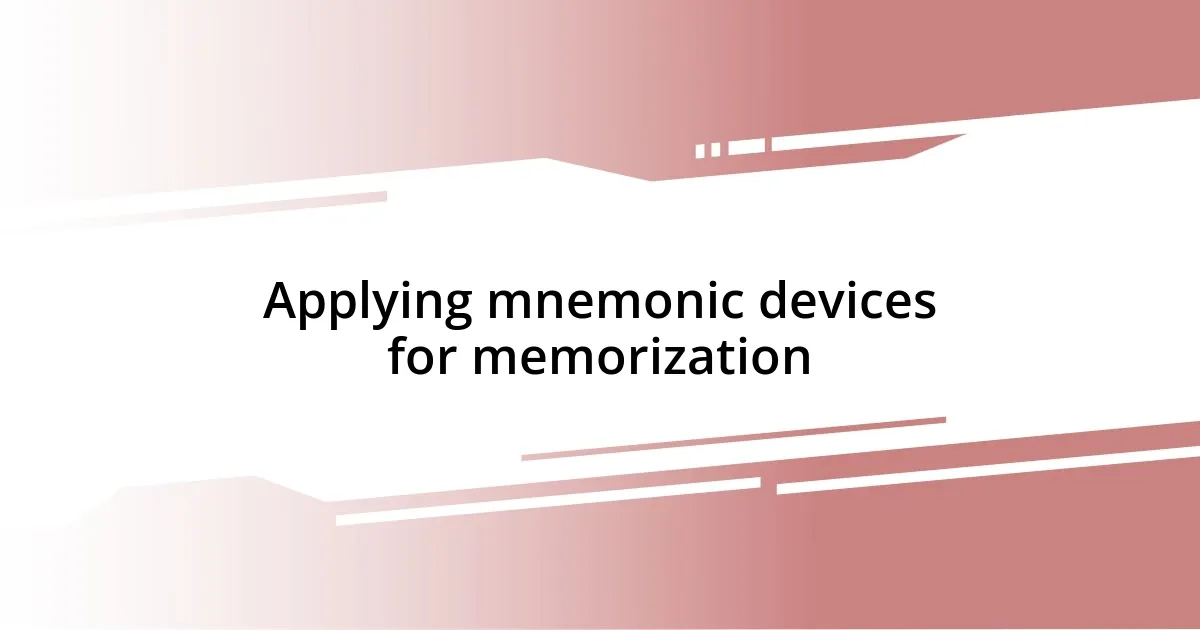
Applying mnemonic devices for memorization
Mnemonic devices are a fantastic way to make vocabulary learning both effective and fun. I often find myself creating vivid mental images or silly phrases that connect the word to its meaning. For instance, when I was trying to remember “cacophony,” I imagined a chaotic scene of cats fighting in a music hall, blending sounds into a hilarious jumble. This playful association makes the word unforgettable.
I also love using acronyms to simplify complex sets of vocabulary. A memorable moment for me was when I struggled with a list of musical terms for a class. I turned the first letters of several difficult words into an acronym: “CAGED”, which reminded me of the guitar chords I used to play. It’s amazing how a simple arrangement of letters can trigger a whole cascade of memories.
Sometimes, rhyming can work wonders too. I remember trying to memorize the word “zealous.” I composed a little rhyme: “When you’re zealous, you’re in a rush, eager to strive, never a hush.” This catchy phrase stuck with me, and even now, it pops into my head whenever I encounter the word. What techniques resonate with you? There’s a certain magic in finding the right mnemonic that clicks personally, making the whole learning process feel like a creative adventure.
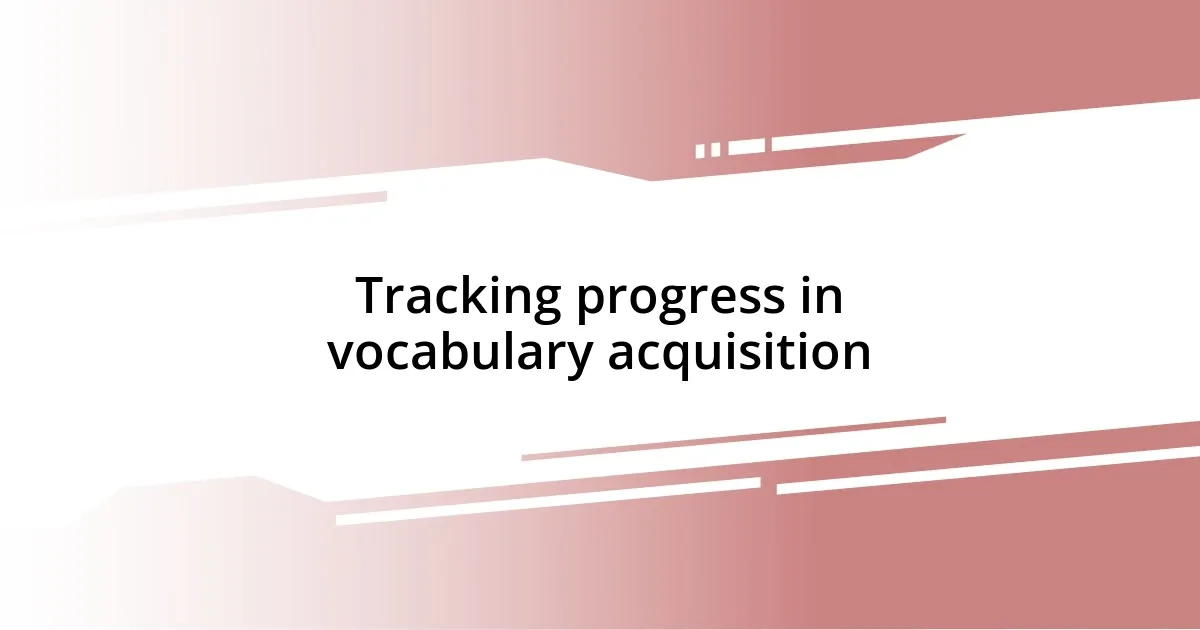
Tracking progress in vocabulary acquisition
Tracking progress in vocabulary acquisition is a crucial part of my learning journey. I’ve found that maintaining a vocabulary journal helps me visualize my growth. Each week, I jot down new words, their meanings, and personal examples of how I used them in sentences. Looking back at these entries not only reinforces my retention but also gives me a tangible sense of achievement. Have you ever experienced that satisfying moment of seeing how far you’ve come?
I also like to use spaced repetition software to track my vocabulary growth. It’s fascinating how technology can complement my learning approach. By scheduling reviews of new words at intervals, I can monitor which terms are sticking and which need more attention. It feels like a puzzle sometimes—figuring out the best way to fit each piece into my memory. Have you considered how regular check-ins can enhance your vocabulary learning?
Another effective method I’ve embraced is setting quantifiable goals. When I aimed to learn 50 new words in a month, I tracked my progress weekly. Celebrating small milestones, like crossing off words from a list, filled me with motivation. There’s something empowering about seeing the numbers grow, don’t you think? This way, I remain accountable and engaged, making the process more rewarding and enjoyable.
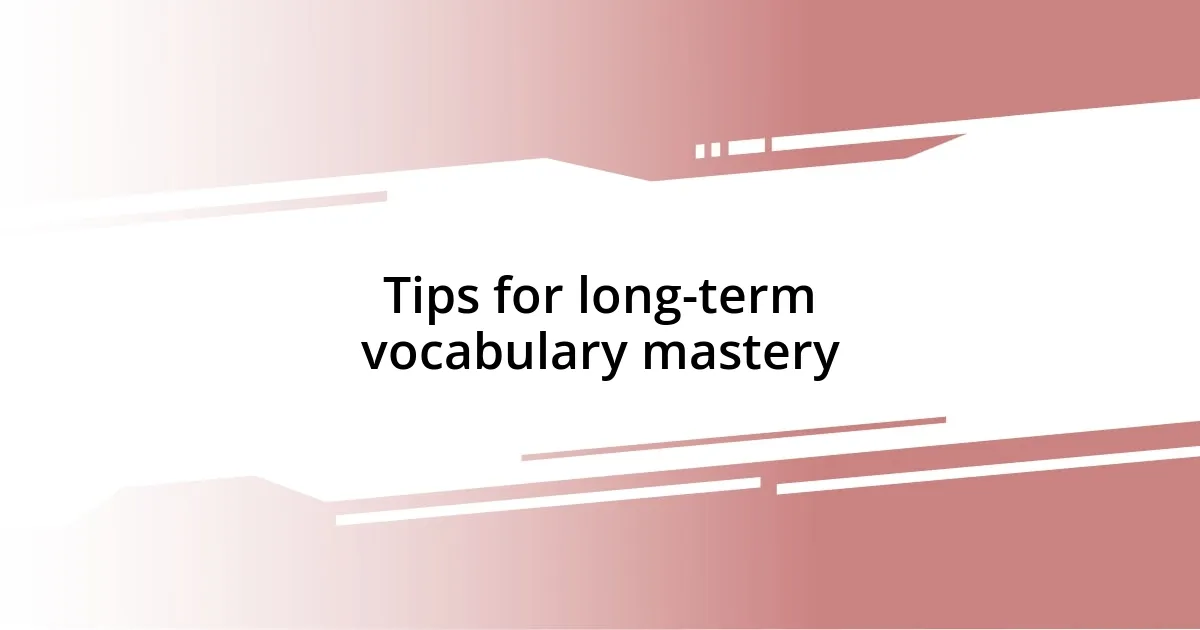
Tips for long-term vocabulary mastery
One of my favorite tips for long-term vocabulary mastery is to use words in context. I remember when I started writing poetry; it transformed my relationship with words. By incorporating new vocabulary into my verses, I found myself not just memorizing definitions but also grasping their nuances and emotional weight. Have you ever felt how a word can completely change the mood of a sentence? That’s the power of context—it breathes life into vocabulary.
Another strategy that has been incredibly effective for me is engaging in conversations that challenge my vocabulary. I recall a lively debate with friends about our favorite books. As we discussed various themes, I seized the opportunity to use new words I’d recently learned, like “juxtaposition” and “ephemeral.” It was thrilling to see how those terms not only enhanced our conversation but also solidified my understanding. Do you think surrounding yourself with articulate speakers could elevate your vocabulary as well?
Don’t underestimate the impact of immersive experiences, whether it’s watching movies in a foreign language or reading novels in your target language. I vividly remember watching a French film that prompted me to jot down phrases that resonated with me. Each time I replayed a particularly poignant scene, I absorbed the language more deeply. Isn’t it remarkable how immersion can unlock layers of meaning in words? Incorporating vocabulary into real-life experiences makes it stick in ways that rote memorization often cannot.

